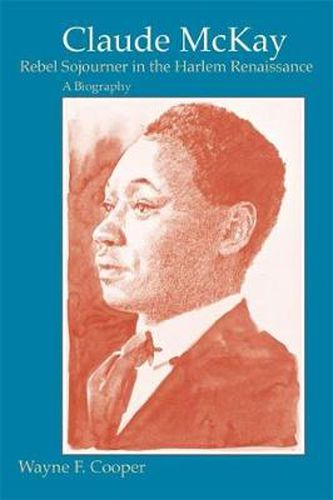Readings Newsletter
Become a Readings Member to make your shopping experience even easier.
Sign in or sign up for free!
You’re not far away from qualifying for FREE standard shipping within Australia
You’ve qualified for FREE standard shipping within Australia
The cart is loading…






This title is printed to order. This book may have been self-published. If so, we cannot guarantee the quality of the content. In the main most books will have gone through the editing process however some may not. We therefore suggest that you be aware of this before ordering this book. If in doubt check either the author or publisher’s details as we are unable to accept any returns unless they are faulty. Please contact us if you have any questions.
Cooper paints a meticulous and absorbing portrait of McKay’s restless artistic, intellectual, and political odyssey… The definitive biography on McKay. - Choice
Although recognised today as one of the genuine pioneers of black literature in this century, the author of If We Must Die, Home to Harlem, Banana Bottom, and A Long Way from Home, among other works, Claude McKay (1890-1948) died penniless and almost forgotten in a Chicago hospital. In this masterly study, Wayne Cooper presents a fascinating, detailed account of McKay’s complex, chaotic, and frequently contradictory life.
In his poetry and fiction, as well as in his political and social commentaries, McKay searched for a solid foundation for a valid black identity among the working-class cultures of the West Indies and the United States. He was an undeniably important predecessor to such younger writers of the Harlem Renaissance as Langston Hughes and Countee Cullen, and also to influential West Indian and African writers such as C. L. R. James and Aime Cesaire. Knowledge of his life adds important dimensions to our understanding of American radicalism, the expatriates of the 1920s, and American literature.
Mr. Cooper’s most original contribution is his careful and perceptive analysis of McKay’s nonfiction writing, especially his social and political commentary, which often contained ‘prophetic statements’ on a range of important social, political, and historical issues.
- New York Times Book Review
$9.00 standard shipping within Australia
FREE standard shipping within Australia for orders over $100.00
Express & International shipping calculated at checkout
This title is printed to order. This book may have been self-published. If so, we cannot guarantee the quality of the content. In the main most books will have gone through the editing process however some may not. We therefore suggest that you be aware of this before ordering this book. If in doubt check either the author or publisher’s details as we are unable to accept any returns unless they are faulty. Please contact us if you have any questions.
Cooper paints a meticulous and absorbing portrait of McKay’s restless artistic, intellectual, and political odyssey… The definitive biography on McKay. - Choice
Although recognised today as one of the genuine pioneers of black literature in this century, the author of If We Must Die, Home to Harlem, Banana Bottom, and A Long Way from Home, among other works, Claude McKay (1890-1948) died penniless and almost forgotten in a Chicago hospital. In this masterly study, Wayne Cooper presents a fascinating, detailed account of McKay’s complex, chaotic, and frequently contradictory life.
In his poetry and fiction, as well as in his political and social commentaries, McKay searched for a solid foundation for a valid black identity among the working-class cultures of the West Indies and the United States. He was an undeniably important predecessor to such younger writers of the Harlem Renaissance as Langston Hughes and Countee Cullen, and also to influential West Indian and African writers such as C. L. R. James and Aime Cesaire. Knowledge of his life adds important dimensions to our understanding of American radicalism, the expatriates of the 1920s, and American literature.
Mr. Cooper’s most original contribution is his careful and perceptive analysis of McKay’s nonfiction writing, especially his social and political commentary, which often contained ‘prophetic statements’ on a range of important social, political, and historical issues.
- New York Times Book Review